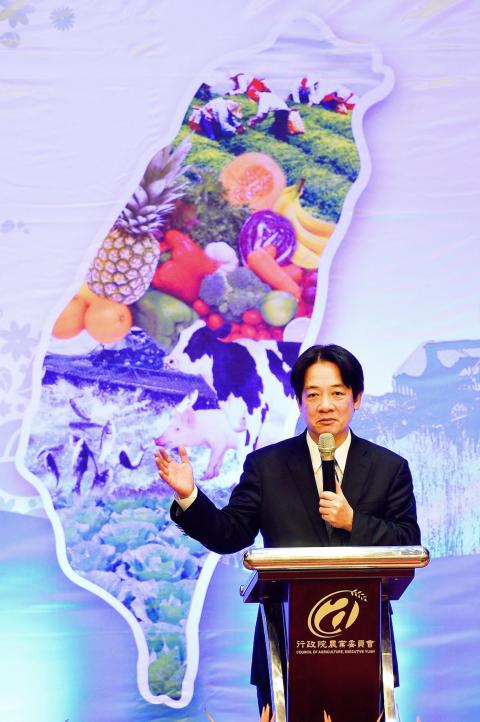Following an online petition urging the government to punish drunk drivers, sex offenders and child abusers by caning, Premier William Lai (賴清德) yesterday said that Taiwanese society would have reservations about the potential human rights violations.
The petition, submitted to a government-funded policy discussion platform on Oct. 23, calls for the government to impose flogging as an additional punishment for drunk driving, sex offenses and violence against children.
With the petition being endorsed by 26,771 netizens, far exceeding the 5,000-signature threshold that requires an official reply from the government, Minister Without Portfolio Audrey Tang (唐鳳) is to preside over a public hearing to discuss the proposal on Dec. 1.

Photo: George Tsorng, Taipei Times
Although current sentiment might favor “a strict penal code in a time of turbulence,” Taiwan is a democratic and law-abiding nation where human rights are valued, Lai said, calling for a more in-depth discussion of the issue.
“A majority of the population will likely have reservations about adopting caning like in Singapore,” Lai said, without revealing his position on the issue.
Tang said the hearing would provide an opportunity to discuss the effectiveness of flogging as a punishment and the possible human rights violations it would entail, as well as its appropriateness for Taiwanese society and alternative methods to prevent crime.
No policy would be formed during the discussion, Tang added.
Asked whether the government should reject the proposal outright instead of convening a hearing over a proposal that apparently runs counter to international human rights covenants, she said that the government should not reject a petition simply because of its provocativeness.
“The person who submitted the petition said he proposed flogging because he believes the Criminal Code is ineffective in preventing those crimes and he hopes to raise public awareness about them, but he is not adamant about flogging,” Tang said.
Many petitions submitted on the platform have proposed seemingly difficult solutions to social situations that would require government efforts, and the government should understand the purpose of such petitions, if not the proposed solutions, she said.
Tang refused to express her stance on the issue, saying that she has to remain neutral as a government official and that her duty is to collect public opinion and possible solutions to facilitate the government’s decisionmaking.

AGING: As of last month, people aged 65 or older accounted for 20.06 percent of the total population and the number of couples who got married fell by 18,685 from 2024 Taiwan has surpassed South Korea as the country least willing to have children, with an annual crude birthrate of 4.62 per 1,000 people, Ministry of the Interior data showed yesterday. The nation was previously ranked the second-lowest country in terms of total fertility rate, or the average number of children a woman has in her lifetime. However, South Korea’s fertility rate began to recover from 2023, with total fertility rate rising from 0.72 and estimated to reach 0.82 to 0.85 by last year, and the crude birthrate projected at 6.7 per 1,000 people. Japan’s crude birthrate was projected to fall below six,

Conflict with Taiwan could leave China with “massive economic disruption, catastrophic military losses, significant social unrest, and devastating sanctions,” a US think tank said in a report released on Monday. The German Marshall Fund released a report titled If China Attacks Taiwan: The Consequences for China of “Minor Conflict” and “Major War” Scenarios. The report details the “massive” economic, military, social and international costs to China in the event of a minor conflict or major war with Taiwan, estimating that the Chinese People’s Liberation Army (PLA) could sustain losses of more than half of its active-duty ground forces, including 100,000 troops. Understanding Chinese

US President Donald Trump in an interview with the New York Times published on Thursday said that “it’s up to” Chinese President Xi Jinping (習近平) what China does on Taiwan, but that he would be “very unhappy” with a change in the “status quo.” “He [Xi] considers it to be a part of China, and that’s up to him what he’s going to be doing, but I’ve expressed to him that I would be very unhappy if he did that, and I don’t think he’ll do that. I hope he doesn’t do that,” Trump said. Trump made the comments in the context

SELF-DEFENSE: Tokyo has accelerated its spending goal and its defense minister said the nation needs to discuss whether it should develop nuclear-powered submarines China is ramping up objections to what it sees as Japan’s desire to acquire nuclear weapons, despite Tokyo’s longstanding renunciation of such arms, deepening another fissure in the two neighbors’ increasingly tense ties. In what appears to be a concerted effort, China’s foreign and defense ministries issued statements on Thursday condemning alleged remilitarism efforts by Tokyo. The remarks came as two of the country’s top think tanks jointly issued a 29-page report framing actions by “right-wing forces” in Japan as posing a “serious threat” to world peace. While that report did not define “right-wing forces,” the Chinese Ministry of Foreign Affairs was